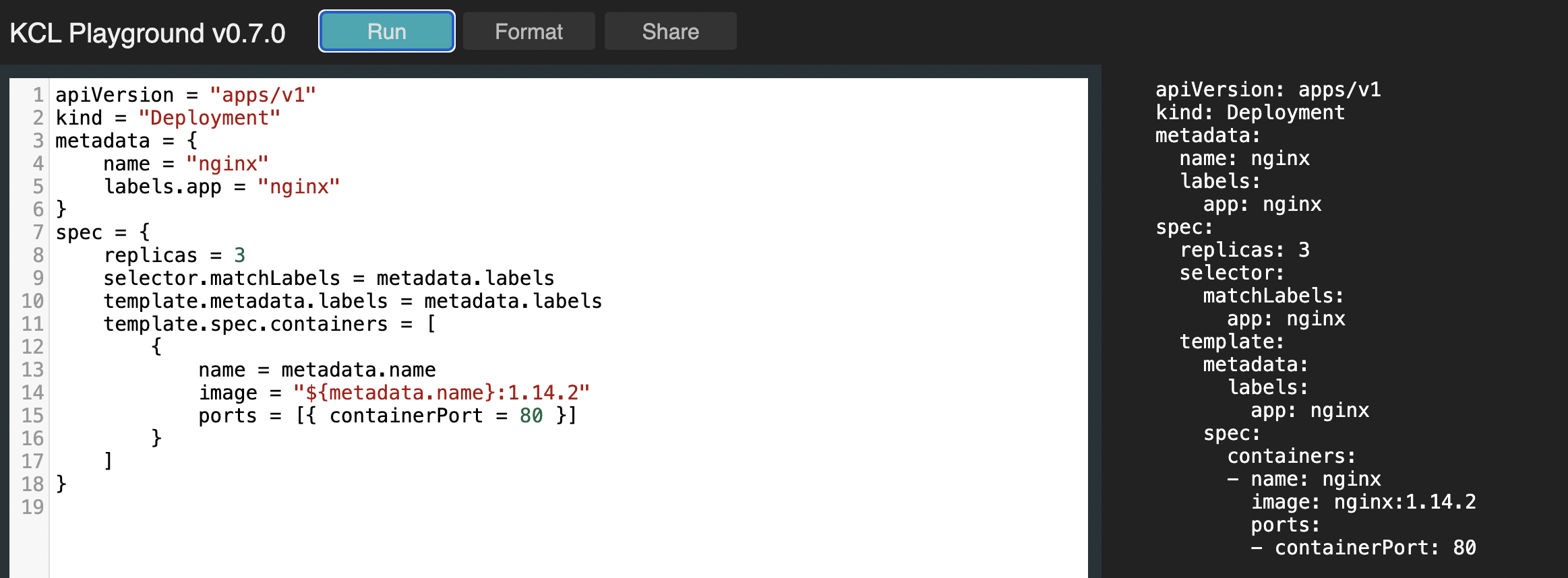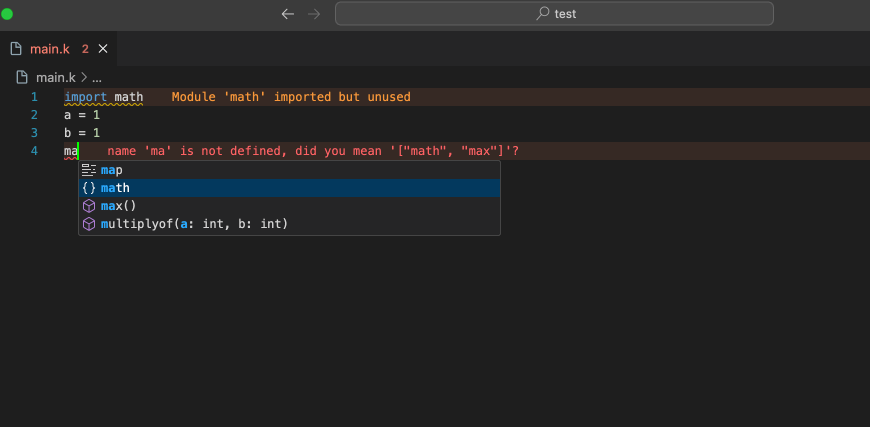
KCL is a constraint-based record and functional language hosted by Cloud Native Computing Foundation (CNCF) that enhances the writing of complex configurations, including those for cloud-native scenarios. With its advanced programming language technology and practices, KCL is dedicated to promoting better modularity, scalability, and stability for configurations. It enables simpler logic writing and offers ease of automation APIs and integration with homegrown systems.
This section will update the KCL language community's latest developments every two weeks, including features, website updates, and the latest community news, helping everyone better understand the KCL community!
KCL Website: https://kcl-lang.io
Overview
Thank you to all contributors for their outstanding work over the past two weeks (12.22 2023 - 01.04 2024). Here is an overview of the key content:
🔧 Toolchain Update
Package Management Tool Update
- Adds support for automatic translation of external package names containing the - symbol to an underscore _ that KCL recognizes, such as set-annotation -> set_annotation
- Fixes a null pointer error caused when kcl mod add encounters a mismatch between the Registry package version and the version of the package already present locally
💻 IDE Update
Semantic Highlighting
- KCL IDE now supports semantic-level highlighting, avoiding differences in highlighting across various IDE plugins
Enhancement for Completion Features
- Differentiates between Schema type and instance completion symbols
- Unifies the format for Schema comment documentation completion
- Fixes inconsistencies in completion symbol types across different syntaxes
Special Thanks
The following are listed in no particular order:
- Thanks to @FLAGLORD, @YiuTerran, @flyinox, @steeling, @Anoop, @Phillip Neumann, and @Even Solberg for their valuable feedback and discussions during the promotion and usage of KCL 🙌
Featured Updates
Using KCL to Write Crossplane Composition Functions
Crossplane and its XRs allow developers to create higher-level abstractions that can encapsulate and compose multiple types of cloud resources across different providers and services. Using Composition Functions to render these abstractions can effectively enhance template capabilities for various provider resources while reducing the amount of YAML code needed.
Combining KCL with Composition Functions offers several benefits:
- Simplification of Complex Configurations: KCL provides a more concise syntax and structure as a DSL, reducing the complexity of configurations. When combined with Crossplane’s composite resources, you can create more intuitive and easy-to-understand configuration templates with loop and condition features, simplifying the definition and maintenance of resources instead of duplicate YAML and Go code snippets.
- Reusability and Modularity: KCL supports modularity and code reuse through OCI Registry, which means you can create reusable configuration components. Combined with Crossplane, this promotes the modularity of composite resources, increases the reuse of configurations, and reduces errors.
- Automation and Policy-Driven: You can use KCL’s powerful features to write policies and constraints that, combined with Crossplane’s declarative resource management, can be automatically enforced, ensuring compliance within the cloud environment.
Additionally, you can refer to here to learn about the differences between KCL and other configuration formats or DSLs.
Prerequisites
- Prepare a Kubernetes cluster
- Install Kubectl
- Install Crossplane and Crossplane CLI 1.14+
- Install Go 1.21+
Quick Start
Let’s write a KCL function abstraction which generates managed resources VPC and InternetGateway with an input resource Network.
1. Install the Crossplane KCL Function
Installing a function creates a function pod. The function logic is processed as a pipeline step in a composition that may create managed resources when triggered through specified parameters.
Install a Function with a Crossplane Function object setting the spec.package value to the location of the function package.
kubectl apply -f- << EOF
apiVersion: pkg.crossplane.io/v1beta1
kind: Function
metadata:
name: kcl-function
spec:
package: xpkg.upbound.io/crossplane-contrib/function-kcl:latest
EOF
2. Apply the Composition Resource
You can apply the composition resource with the inline KCL code into the cluster.
kubectl apply -f- << EOF
apiVersion: apiextensions.crossplane.io/v1
kind: Composition
metadata:
name: xlabels.fn-demo.crossplane.io
labels:
provider: aws
spec:
writeConnectionSecretsToNamespace: crossplane-system
compositeTypeRef:
apiVersion: fn-demo.crossplane.io/v1alpha1
kind: XNetwork
mode: Pipeline
pipeline:
- step: normal
functionRef:
name: kcl-function
input:
apiVersion: krm.kcl.dev/v1alpha1
kind: KCLRun
metadata:
name: basic
spec:
# Generate new resources
target: Resources
# OCI, Git or inline source
# source: oci://ghcr.io/kcl-lang/crossplane-xnetwork-kcl-function
# source: github.com/kcl-lang/modules/crossplane-xnetwork-kcl-function
source: |
# Get the XR spec fields
id = option("params")?.oxr?.spec.id or ""
# Render XR to crossplane managed resources
network_id_labels = {"networks.meta.fn.crossplane.io/network-id" = id} if id else {}
vpc = {
apiVersion = "ec2.aws.upbound.io/v1beta1"
kind = "VPC"
metadata.name = "vpc"
metadata.labels = network_id_labels
spec.forProvider = {
region = "eu-west-1"
cidrBlock = "192.168.0.0/16"
enableDnsSupport = True
enableDnsHostnames = True
}
}
gateway = {
apiVersion = "ec2.aws.upbound.io/v1beta1"
kind = "InternetGateway"
metadata.name = "gateway"
metadata.labels = network_id_labels
spec.forProvider = {
region = "eu-west-1"
vpcIdSelector.matchControllerRef = True
}
}
items = [vpc, gateway]
EOF
3. Create Crossplane XRD
We define a schema using the crossplane XRD for the input resource Network, it has a field named id which denotes the network id.
kubectl apply -f- << EOF
apiVersion: apiextensions.crossplane.io/v1
kind: CompositeResourceDefinition
metadata:
name: xnetworks.fn-demo.crossplane.io
spec:
group: fn-demo.crossplane.io
names:
kind: XNetwork
plural: xnetworks
claimNames:
kind: Network
plural: networks
versions:
- name: v1alpha1
served: true
referenceable: true
schema:
openAPIV3Schema:
type: object
properties:
spec:
type: object
properties:
id:
type: string
description: ID of this Network that other objects will use to refer to it.
required:
- id
EOF
4. Apply the Crossplane XR
kubectl apply -f- << EOF
apiVersion: fn-demo.crossplane.io/v1alpha1
kind: Network
metadata:
name: network-test-functions
namespace: default
spec:
id: network-test-functions
EOF
5. Verify the Generated Managed Resources
- VPC
kubectl get VPC -o yaml | grep network-id
networks.meta.fn.crossplane.io/network-id: network-test-functions
- InternetGateway
kubectl get InternetGateway -o yaml | grep network-id
networks.meta.fn.crossplane.io/network-id: network-test-functions
It can be seen that we have indeed successfully generated VPC and InternetGateway resources, and their fields meet expectations.
6. Debugging KCL Functions Locally
See here for more information and examples.
Client Enhancements
It can be seen that the above abstract code often requires a crossplane as a control plane intermediary, and you can still complete the abstraction in a fully client-side manner and directly generate crossplane managed resources to reduce the burden on the cluster.
On the client side, there are two methods to render managed resources. One method is to use the crossplane beta render command, and the other is to render directly using the kcl run command. The usage for the former can be found here. For the latter, the usage is as follows.
kcl run oci://ghcr.io/kcl-lang/crossplane-xnetwork-kcl-function -S items -D params='{"oxr": {"spec": {"id": "network-test-functions"}}}'
The output is
apiVersion: ec2.aws.upbound.io/v1beta1
kind: VPC
metadata:
name: vpc
labels:
networks.meta.fn.crossplane.io/network-id: network-test-functions
spec:
forProvider:
region: eu-west-1
cidrBlock: 192.168.0.0/16
enableDnsSupport: true
enableDnsHostnames: true
---
apiVersion: ec2.aws.upbound.io/v1beta1
kind: InternetGateway
metadata:
name: gateway
labels:
networks.meta.fn.crossplane.io/network-id: network-test-functions
spec:
forProvider:
region: eu-west-1
vpcIdSelector:
matchControllerRef: true
Both methods require a registry (usually docker.io) to assist in completing the work. The ultimate choice between them may depend on your operational habits and environmental costs. Regardless of the method chosen, we recommend maintaining your KCL code in Git to better implement GitOps and obtain a better IDE experience and reusable modules such as the Crossplane AWS Provider Modules.
Resources
❤️ Thanks to all KCL users and community members for their valuable feedback and suggestions in the community. See here to join us!
For more resources, please refer to

